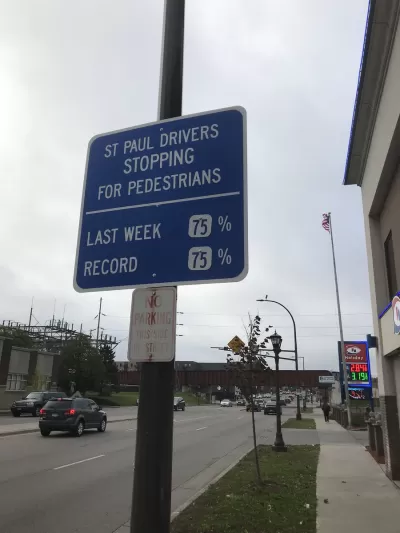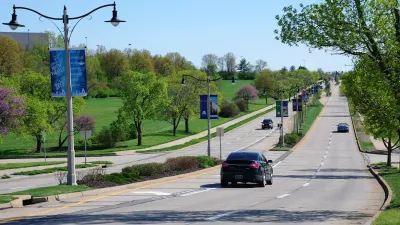A new study sheds light on what actually convinces drivers to slow down and stop for pedestrians.

Angie Schmitt reports on the findings of an analysis by Nichole Morris, director of the HumanFIRST Laboratory at the University of Minnesota, of drivers yielding at crosswalks around St. Paul.
Morris and her team initially found yielding rates were dreadful: Only 32 percent of drivers stopped. But they were able to improve that number more than double that using “human factors psychology,” which is focused on altering group behavior.
Human factors psychology includes other jargon-y sounding terms like "social norming" and "implied surveillance." But Schmitt interviews Morris in person to clarify more of the concepts behind this tool for convincing drivers to slow and even stop for the safety and right of way of pedestrians.
FULL STORY: To Get Drivers to Yield, St. Paul Uses Psych Trick

Planetizen Federal Action Tracker
A weekly monitor of how Trump’s orders and actions are impacting planners and planning in America.

USGS Water Science Centers Targeted for Closure
If their work is suspended, states could lose a valuable resource for monitoring, understanding, and managing water resources.

End Human Sacrifices to the Demanding Gods of Automobile Dependency and Sprawl
The U.S. has much higher traffic fatality rates than peer countries due to automobile dependency and sprawl. Better planning can reduce these human sacrifices.

Trump: Federal Government Won’t Pay for California HSR
The President has targeted federal funding for the California bullet train project since his first administration.

San Francisco Enhances Urban Planning Initiatives with Green Infrastructure
San Francisco incorporates green infrastructure in its city development initiatives, elevating the importance of sustainability in urban planning.

Chicago Approves Green Affordable Housing Plan
The Mayor’s plan calls for creating a nonprofit housing corporation tasked with building affordable housing that meets Green Building standards.
Urban Design for Planners 1: Software Tools
This six-course series explores essential urban design concepts using open source software and equips planners with the tools they need to participate fully in the urban design process.
Planning for Universal Design
Learn the tools for implementing Universal Design in planning regulations.
Tyler Technologies
New York City School Construction Authority
Village of Glen Ellyn
Transportation Research & Education Center (TREC) at Portland State University
Chaddick Institute at DePaul University
Institute for Housing and Urban Development Studies (IHS)
Regional Transportation Commission of Southern Nevada
Toledo-Lucas County Plan Commissions





























